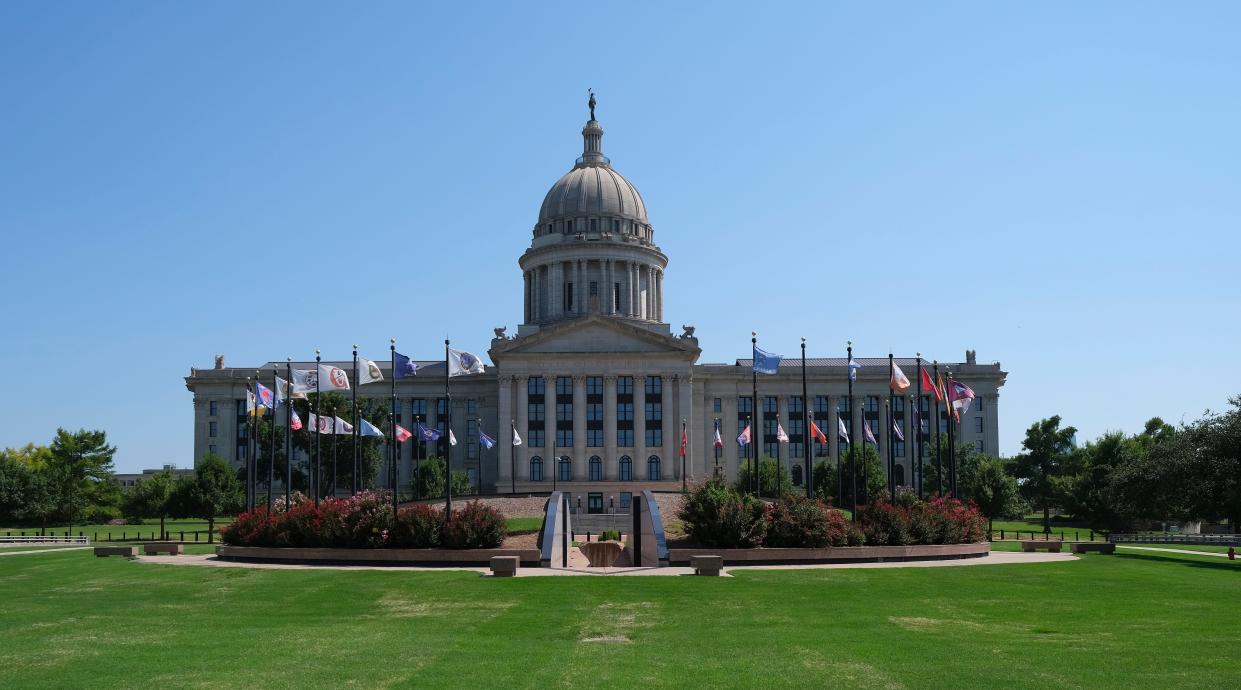Poll: Oklahoma voters want state and tribes to work together amid political tensions

- Oops!Something went wrong.Please try again later.
Most voters view tribal nations as a benefit to Oklahoma and believe state officials should collaborate with tribal leaders, a new poll shows.
The results of the latest Sooner Survey cut through the political tension that has ramped up between Gov. Kevin Stitt and many tribal leaders over disagreements as wide ranging as tobacco taxes and traffic tickets.
Four in five voters think the state should work with tribal nations to improve Oklahoma, according to the poll.
Those talks were happening Tuesday, when some state officials and tribal representatives convened near Durant to discuss ways to team up on economic development.
Gary Batton, the chief of the Choctaw Nation, described the poll results as great to hear at this moment in the state’s history. “Some people would say it’s troubling times,” Batton told the crowd of about 150 people gathered for the business conference. “But you know, I think there’s great opportunities.”
Majority of Oklahoma voters see benefits of good relationship between tribes, state government
The poll showed 80% of registered voters agreed tribes and tribal governments are good for Oklahoma, while the share dipped slightly to 73% among Republicans and rose to 94% among Democrats.
The results were drawn from the responses of 500 voters, who were surveyed in August by Cole, Hargrave, Snodgrass and Associates. The Oklahoma City firm estimated the poll’s margin of error at 4 percent.
More: Five Tribes vote no confidence in Governor Stitt's new liaison for Native affairs
When asked an open-ended question about why tribes were a benefit to Oklahoma, one-third of voters referred to the economic impact of tribal nations, which are among the state’s largest employers, especially in rural areas.
Rep. Meloyde Blancett, a Tulsa Democrat, said the survey shows Oklahomans see the untapped potential partnerships with tribes. She was speaking at the business conference, which was hosted by the Oklahoma Tribal Finance Consortium at the Choctaw Casino & Resort south of Durant.
“The vast majority of Oklahomans absolutely believe that our tribal nations are an opportunity for us to explore,” Blancett said. “They look upon the tribal sovereignty as not a problematic issue at all.”
Tribal sovereignty, or the right of tribal nations to govern themselves, has become an increasing point of debate for Stitt. The governor has challenged the limits of state authority — and the expansion of tribal authority — on tribal reservations recognized after the landmark McGirt v. Oklahoma ruling. The U.S. Supreme Court handed down the decision in 2020.
More: Oklahoma governor's call for special session on tax fairness raises criticism, crickets
Eighty-six percent of voters said they had heard about the ruling, according to the Sooner Survey. The pollsters asked people who they trusted most to address issues stemming from the decision, offering the choice of Stitt, tribes, the federal government and Attorney General Gentner Drummond.
Tribes and Drummond both drew similar support, at 27% and 26%, respectively. Stitt received 18%, and the federal government 16%.
In response to questions about the poll, Stitt’s spokesperson Abegail Cave did not directly address the results, but indicated they would not change the governor's approach.
"Gov. Stitt is fighting for fairness on behalf of all 4 million Oklahomans, and he will continue to do that," she said in a statement.
'We've got to do more to work together'
Chuck Hoskin Jr., the principal chief of the Cherokee Nation, said the results show the vast majority of Oklahomans believe tribes are good partners. “We were rooted here before statehood in 1907 and continue to help make our state vibrant and strong still today,” Hoskin said in a statement.
Voters ultimately want the state and tribes to partner, a sentiment that transcends political parties and places of residence, wrote Pat McFerron, the president of the firm that conducted the poll.
Leslie Osborn, state labor commissioner, said she believes her agency and many others already have good relations with tribal counterparts, but the work can get drowned out by “loud, angry voices.”
“It’s to my chagrin and several other of my statewide elected officials that we are in an impasse on some of those relationships,” she said at the business conference. “But I believe this will be a temporary aberration in our long history, and that we’ve got to do more to work together.”
She called out workforce development as one of the most pressing areas needing collaboration. As one example, she pointed to the extreme shortage of affordable child care, which is keeping young people, particularly women, out of the workforce. She said she has toured child care facilities operated by tribes to see if the state could consider a similar approach.
“When we have such shortages and there is a way that it could be fixed, we need to do everything we can to work with partners to get that done,” Osborn said.
State and tribal officials also are working together to provide clean water to communities and upgrade existing water systems, said Ken McQueen, Oklahoma secretary for energy and environment. The Oklahoma Legislature committed $72 million in federal COVID-19 relief funding for the water projects, and tribal governments matched that amount, doubling the amount of aid available, he said.
“If we can demonstrate success,” McQueen said, “then we have a firm foundation to build on in the future.”
Editor's note: This story has been updated to include a response from the governor's office.
Read more:
Dispute over Oklahoma tribal compacts is heading to state courts. Here's why
Legislature can renew tribal compacts without Stitt, lawmakers tell Oklahoma Supreme Court
Molly Young covers Indigenous affairs. Reach her at mollyyoung@gannett.com or 405-347-3534.
This article originally appeared on Oklahoman: Most Oklahoma voters see tribal nations as a plus, poll shows

